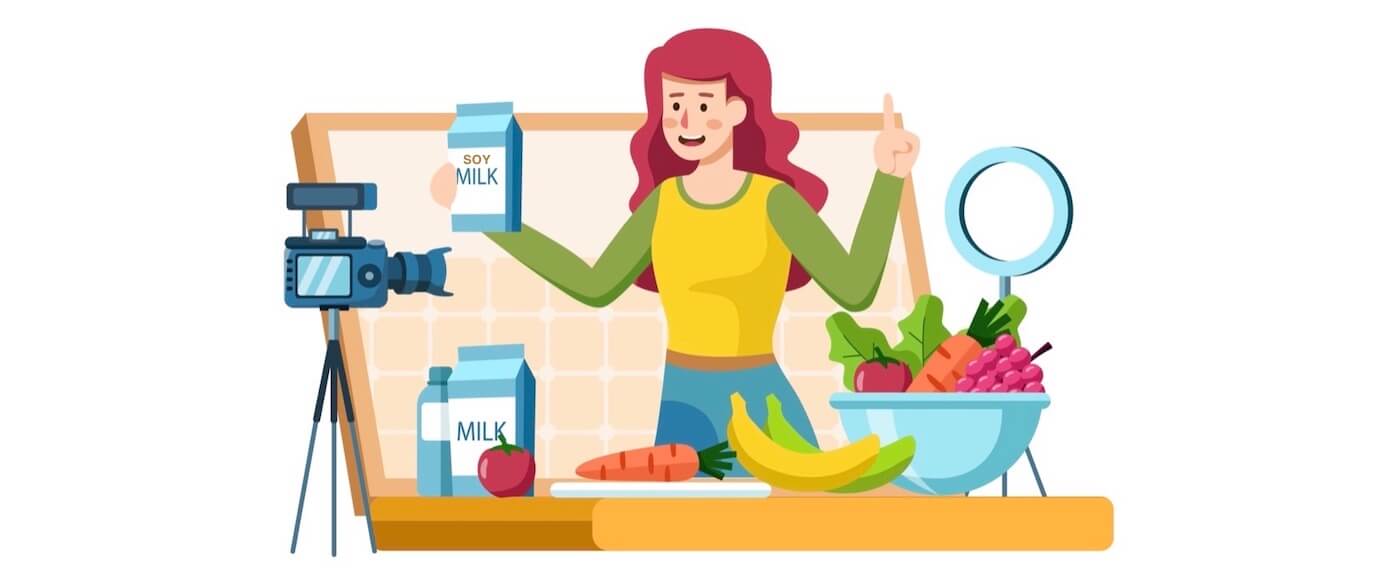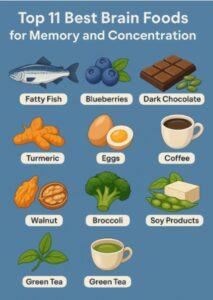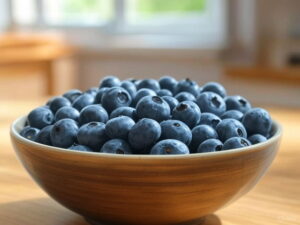
Foods Which Improve Memory And Concentration
Table of Contents
The human brain is the most energy-demanding organ in the body. Though it comprises a paltry 2% of our weight, it claims over 20% of the daily calorie supply. For that reason, food has a tangible and measurable effect on memory, attention span, mental sharpness, and mood. Our brains must have particular foods to function optimally.
In today’s fast-paced world, many individuals struggle with brain fog, forgetfulness, or mental fatigue—often without realizing that poor nutrition could be the root cause. The good news is: the smart diet can help. Let’s explore the top 11 cognitive-enhancing foods backed by science and explain how they can sharpen your mind and help prevent long-term decline. Regardless of whether you are a student looking to recall more or an office worker trying to remain focused at work, understanding the best food for brain health is your first step toward better focus and mental energy in the long run.

Why Is Brain Nutrition Important: The Link Between Diet and Cognitive Function
Food not only energizes the body but also builds the brain. Each neuron connection, chemical messenger, and memory is shaped by what we consume. Food nutrients like omega-3 fatty acids, antioxidants, B vitamins, and amino acids directly contribute to the production of neurotransmitters, dampen inflammation, and maintain neural plasticity (the brain’s capacity to learn and adapt).
Harvard Health studies have determined that diets with plenty of leafy greens, fatty fish, berries, and nuts are uniformly linked with lower rates of cognitive decline. These foods that help with focus don’t make magic happen overnight, but they steadily build up a brain able to withstand stress, distraction, and aging.
Think about nutrition as the foundation for everything your brain does, ranging from resolving problems and picking up new abilities to emotional control and remaining engaged in meetings. It’s not just about preventing disease. It’s about being a strong thinker.
What Happens When You Lack Brain Nutrition?
When the brain isn’t receiving the nutrients it needs, the effect is surprisingly quick and widespread. Poor diet may lead to oxidative stress, inflammation, and slower nerve transmission. The most common effect is likely brain fog—a dull, unfocused state of mind where even routine activities feel like endurance tests.
This is where many start seeking answers. Among the most popularly searched questions is: brain fog causes and how to fix it. An answer is in food. Without magnesium, choline, and omega-3 nutrients, brain power decreases. Recall of memory is compromised. Focus drifts. With time, deficiencies can even lead to dementia and depression.
Piling on blueberries, pumpkin seeds, and dark chocolate as memory boosters in food is more than a health fad—it’s a brain investment in the future. While supplements only provide isolated vitamins, fiber, healthy fats, and antioxidants that act independently, whole foods offer a mix of them that occurs synergistically.
Understanding this link allows you to make more intentional choices each day. You don’t have to overhaul your diet in one night. Start small—swap a snack for nuts, add turmeric to your broth, or eat fish once a week. Every brain-supporting bite brings you closer to a clearer, sharper mind.
How Foods Improve Memory: Neurotransmitters, Brain Cells, and Nutrient Synergy
The network of the brain relies on a fine balance of neurotransmitters, neurons, and nutrients. Omega-3 fatty acids, B vitamins, and antioxidants are among the critical compounds that play an integral part in maintaining this equilibrium. They enhance synaptic plasticity, facilitate proper signal transmission, and protect against oxidative stress, all of which are crucial for cognitive functions like memory and focus.
World-renowned neuroscientist Dr. Rudolph E. Tanzi points to the role of diet in brain health:
“Food for thought” is more than just a catchy phrase. Specific foods can actually improve your memory, prevent brain disease, and lessen the effects of conditions such as Alzheimer’s disease.
Supplementing one’s diet with foods for memory improvement is not only about enhancing recall, but also about constructing the structural and functional integrity of the brain. For instance, consuming brain foods for memory, like blueberries and fatty fish, supplies the brain with antioxidants and omega-3s that combat inflammation and ensure neuronal health. Similarly, foods that improve memory and concentration, like leafy greens and nuts, supply the necessary vitamins and minerals for neurotransmitter synthesis and energy metabolism.
By giving priority to these nutrient-dense foods, individuals can actively maintain their brain health, have sharper concentration, and improve memory recall throughout their lives.
Top 11 Brain Foods for Concentration and Memory

- Fatty Fish (e.g., Salmon, Mackerel)
Salmon, mackerel, and sardines are not just good for the heart—they’re also your brain’s BFF. They’re bursting with DHA, a type of omega-3 brain-function enhancer that keeps your neurons communicating optimally. Individuals who eat oily fish regularly possess better memory and slower age-related cognitive impairment. No surprise, they’re frequently placed on the brain-healthy food list.
- Blueberries
These little berries pack the big guns. Blueberries contain high levels of anthocyanins, plant pigments that help improve brain cell communication and retard loss of memory. Clinical trials have shown that daily blueberry intake improves the memory functioning of older adults. If you’re wondering what to eat to improve memory, this is one of the tastiest answers.
- Dark Chocolate
Forget guilt—dark chocolate can sharpen your thinking. The flavonoids in dark chocolate boost blood flow to the brain and encourage neuron growth. It’s also a mood-lifter thanks to a natural compound that enhances serotonin. Just a square or two can act as one of the most enjoyable memory booster foods around.
- Pumpkin Seeds
Don’t ignore these crunchy seeds. Full of zinc, iron, magnesium, and copper, they feed the brain what it needs to function at its best. These minerals fuel nerve communication and repel brain fog—a perfect combination for anyone attempting a brain fog diet.
- Coffee
Coffee is more than a morning alarm call. The caffeine keeps you concentrated by blocking out adenosine and boosting dopamine. Over the long term, it can even reduce the risk of neurodegenerative illnesses. For anyone with late-night study sessions or early morning meetings, it’s the perfect solution.
- Turmeric
Turmeric’s active ingredient, curcumin, crosses the blood-brain barrier and gets to work, reducing inflammation and possibly even stimulating new brain cells. It’s a powerful addition to your routine if you’re interested in foods that improve memory and concentration.
- Nuts (Especially Walnuts)
Nuts supply both antioxidants and good fats, and walnuts happen to have high DHA. That is why they’re brain-nourishing foods that promote long-term memory. Eating a handful every day keeps forgetfulness at bay.
- Eggs (Choline)
Eggs are an underrated brain food. They’re one of the primary sources of choline, a nutrient that is used to make acetylcholine, a neurotransmitter linked to memory and mood. If you have no clue how to sharpen memory naturally, this breakfast staple is a great place to start.
- Broccoli
Brain-protective, broccoli provides vitamin K, folate, and antioxidants. These compounds encourage healthy brain cell development and shield them from long-term damage. Imagine it as brain armor in veggie form.
- Soy Products (Tofu, Edamame)
Soy is rich in polyphenols, which are antioxidants and may retard age-related mental decline. Tofu and edamame are particularly good for vegetarians who nevertheless want access to memory booster foods.
- Green Tea
Green tea delivers more than relaxing energy—it contains caffeine and L-theanine, the perfect pair for boosting attention. That smooth kick is exactly what’s needed for lengthy workdays or all-night study sessions. It is one of the top quiet-but-mighty brain foods for memory and recall.
These 11 foods are more than nutritional trends—they’re science-backed tools for keeping your brain sharp. Whether you’re a student, a busy professional, or someone looking to age wisely, integrating these choices into your routine helps support focus, recall, and mental energy—naturally and deliciously.
Expert Tips to Get the Most from Your Brain Food
To maximize the impact of brain foods for memory, it is crucial to incorporate a range of nutrient-rich foods into your diet. Balance is the key to enhanced cognitive ability, so try a mix of brain foods that have short-term concentration benefits and can sustain brain well-being.
Start by including choline and brain function sources, like eggs or soy foods, in your diet, crucial to memory mechanisms. Also, ensure that your diet is rich in antioxidants, which protect against the brain impact of oxidative stress.
Combine your brain-boosting diet with other good practices for optimal benefit, such as exercising regularly and playing brain games. Don’t forget the importance of staying hydrated—dehydration can adversely affect memory and concentration.
As you incorporate these foods into your diet, also try to consume the best vitamins for memory, such as Vitamin E, Vitamin B12, and Vitamin D, which facilitate cognitive functioning in old age.
Conclusion
Having these best brain foods in your diet is a good step toward enhancing memory, concentration, and general mental ability. A balanced, nutrient-rich diet promotes brain function and protects against age-related cognitive decline. Remember, one of the key elements is consistency—by adding these foods to your everyday meals, you’ll be giving your brain the fuel it requires to work at its best. Pay attention to what you’re eating, and you’ll find yourself with improved mental sharpness and remembering things all too quickly.